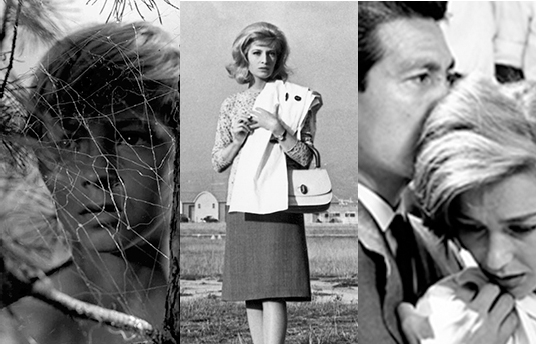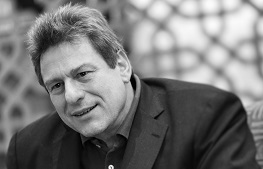2021
‘Watching the Classics’ with Richard Peña: The Modernist Impulse

- Start date:
- Aug 23, 2021
- Ability Level:
- Intermediate
A focus on films from Alain Resnais, Andrei Tarkovsky and Michelangelo Antonioni.
Doha Film Institute is delighted to present ‘Watching the Classics’, an online programme during which filmmakers and cinephiles alike can deepen their knowledge of film history. Presented by renowned scholar Richard Peña (Professor of Film Studies at Columbia University and Director Emeritus of the New York Film Festival), this series of three lectures/discussions each focuses on an undisputed world cinema classic.
In the weekly sessions, Professor Peña will present a given film within its aesthetic, economic, technological and social/political context, detailing each director’s formal techniques while teasing out the implications of these artistic and technical decisions.
To get the most from the programme, participants are recommended to view the films before each lecture, and all are readily available through various streaming services. During the lecture, select images and clips will be included for discussion, and participants will be able to send Professor Peña questions, which will be addressed at the end of each session.
Join us for this chance to revisit some of your favourite films—or to discover works that have helped change the course of film history. After focusing on some of Alfred Hitchcock’s most important works during the last session, Professor Richard Peña will present ‘The Modernist Impulse’ this time.
The Modernist Impulse
In July’s 1959 issue of ‘Cahiers du Cinema’, a round table discussion was centrally featured—the subject was Alain Resnais’s ‘Hiroshima Mon Amour’. Just premiered at Cannes, the film had a controversial reception; some people loved it as much as others despised it. The members of the round table were equally divided. Still, on one thing they did agree—the film proposed an entirely new form of cinematic expression, so much so that one speaker would propose that henceforth the history of cinema would be written: “before and after Hiroshima Mon Amour”.
What these Cahiers writers were referring to was the full-blown emergence of what came to be called cinematic modernism—an international movement of filmmakers who had decided to abandon, in their own distinct ways, the forms and structures that had dominated cinematic storytelling since at least the 1920s. Narratives could now be incomplete, elliptical or even contradictory; protagonists no longer had clear goals or desires, but often seemed lost or simply impulsive. New technologies for image and sound allowed filmmakers to incorporate aspects of the real, physical world into the fictional one. Filmmakers now sought dialogue with the most adventurous trends in literature, theatre, the visual arts and even music.
The “classical cinema”—the kind of cinematic storytelling associated most with Hollywood—would of course never disappear, but the modernist cinema would have a powerful impact on the cinema, demonstrating so many new ways cinema could be expressive and meaningful that went far beyond the limited playbook of Hollywood. Curiously, so many of the filmmakers associated with cinematic modernism—Resnais, Antonioni, Tarkovsky, Godard, Bergman, Oshima and a host of others—are perhaps even more popular today than in the 1960s and 1970s.
This brief series will present three milestones of cinematic modernism—Alain Resnais’s ‘Hiroshima Mon Amour’, Andrei Tarkovsky’s ‘Ivan’s Childhood’ and Michelangelo Antonioni’s ‘Eclipse’—offering detailed analyses of each individual film as well as connections to contemporary movements in the other arts from which the modernists drew so much inspiration. Join us for a journey through some of the most challenging—and most revealing—moments in a movement whose impact can still be felt today.
SESSION ONE
‘Hiroshima Mon Amour’ | 1959 | Alain Resnais | France, Japan
A French actress travels to Hiroshima to work on a “film about peace”. There, she meets and has a passionate affair with a Japanese architect, right before she’s to return home. End of story? Hardly—rather, the jumping-off point for Resnais’s extraordinary meditation on memory and history, both personal and national. With an original screenplay by Marguerite Duras, a leading experimental novelist, Resnais consistently confounds time and space, moving between wartime France and contemporary Hiroshima while creating a world in which sensory perception is increasingly overtaken by fears, desires and fantasies.
SESSION TWO
‘Ivan’s Childhood (Ivanovo Detstvo)’ | 1962 | Andrei Tarkovsky | USSR
The period known as “the Thaw”—a period of gradual opening up of the Soviet cultural and social space following the death and denunciation of Stalin—led to a veritable revolution in Soviet filmmaking, with filmmakers now creating stories built around ambiguity that often emphasized the personal and individual over the collective and national. Winner of the Golden Lion at Venice, ‘Ivan’s Childhood’ and its young director Andrei Tarkovsky burst on the international film scene with an energy and creativity not seen in the Soviet cinema since Eisenstein in the 1920s. With its tale of a young boy lost in the fog of World War 2, the film offered not only a revisionist view of the War but also came to represent all the young Soviet citizens attempting to live in a world of constantly shifting truths and values.
SESSION THREE
‘Eclipse (L’eclisse)’ | 1962 | Michelangelo Antonioni | Italy
The third and boldest part of a very loosely conceived trilogy of films about postwar Italian society, ‘Eclipse’ begins with an extraordinary scene of two lovers ending their relationship, a meticulous, almost silent ballet as the two avoid speaking the obvious. Michelangelo Antonioni was the master of the “indirect”; what his characters do often matters less than the implications of those actions. Monica Vitti, very much the director’s muse in this period, gives her greatest performance, wandering through landscapes that speak of order, happiness and prosperity yet which can’t hide the sense of desperation that envelops everyone—also starring Alain Delon and Francisco Rabal.
Dates: 23 August, 30 August, 6 September 2021 (3 sessions)
Hours: 5:30 to 7:30 PM (Doha Time)
Language: English
Fee: 250 QAR (includes all three sessions of the workshop)*
*Qatar Museums Culture Pass members will receive a 10% discount on this lab’s fee. To avail of the discount, simply include a copy of your Culture Pass when applying.
Eligibility
This programme is open to applicants over the age of 18. The sessions are best suited for those with some knowledge of filmmaking and who wish to expand their understanding of film history.
Registration Process
Session 1 has already passed. You can now purchase individual tickets for the next two sessions as below:
-
30 August
Watching the Classics with Richard Peña: The Modernist Impulse – Session 2 – ‘Ivan’s Childhood’ (1962)
Standard Price – 100 QAR
Qatar Museum’s Culture Pass Discount – 90 QAR -
6 September
Watching the Classics with Richard Peña: The Modernist Impulse – Session 3 – ‘Eclipse’ (1962)
Standard Price – 100 QAR
Qatar Museum’s Culture Pass Discount – 90 QAR
If choosing this option, please email a copy of your Culture Pass to training@dohafilminstitute.com
Your registration will be confirmed once your payment is processed.
You will receive all necessary webinar links via email reminders before the sessions.
Please note:
Registrations are only accepted for the complete workshop, not for individual sessions.
Lab Mentor

Richard Peña
Richard Peña was the Programme Director of the Film Society of Lincoln Center and the Director of the New York Film Festival from 1988 until 2012. At the Film Society, Peña organised retrospectives of many film artists, as well as major film series devoted to numerous national cinemas. Together with Unifrance, in 1995 he created Rendez-Vous with French Cinema, the leading American showcase for new French cinema. He is Professor of Film and Media Studies at Columbia University, where he specialises in film theory and international cinema, and has served as a Visiting Professor at the Sorbonne, Beijing University, UNAM-Mexico City and the University of São Paulo. He also currently hosts WNET/Channel 13’s weekly ‘Reel 13’.